CIS
Il partito vicino al presidente Saakashvili ha clamorosamente perso le legislative. Troppe sono state nel recente passato le promesse mancate in campo socio-economico insieme alla macchia indelebile di aver scatenato nell’estate 2008 una disastrosa guerra, persa contro la Russia per riconquistare la provincia ribelle dell’Ossezia meridionale. 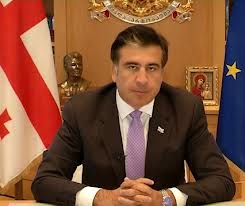
Non appena le litigiose opposizioni sono riuscite a trovare un vero leader i georgiani gli hanno accordato fiducia. La capitale Tbilisi ha votato compatta per il miliardario Ivanishvili, mentre la provincia solo in parte. Il 44enne Michail Saakashvili rischiava di diventare eccessivamente ingombrante non solo per la sua prestanza fisica.
Il 2013 è un anno cruciale per il Paese caucasico. L’eroe della “rivoluzione delle rose” concluderà il suo secondo ed ultimo mandato presidenziale (diventando ineleggibile) ed entrerà in vigore la nuova Costituzione che ridistribuisce i poteri. La Georgia si trasforma in repubblica parlamentare con il primo ministro ad avere prerogative quasi più importanti del capo dello Stato. Grande era, quindi, il pericolo che a Tbilisi andasse in onda una “mossa alla Putin” in cui un leader esce dalla porta principale e rientra dalla finestra.
Diciamolo subito: chi scrive non ha mai avuto simpatia per la “rivoluzione delle rose”, primo cambio di dirigenza pro-occidentale attraverso la piazza nello spazio ex sovietico nel 2003, in tutto simile all’analogo colpo di mano di Belgrado contro Milosevic del ‘99. Saakashivili andò al potere rovesciando il suo maestro e mentore, nonché padrino di suo figlio, Eduard Shevardnadze, uno dei pochi democratici della leadership sovietica che volle la fine della Guerra Fredda. L’uso sapiente dei nuovi mass media e l’appoggio giusto nelle cancellerie statunitense ed europee fecero passare l’ex ministro degli Esteri di Gorbaciov per “un dittatore”, un “dinosauro d’altri tempi”, dimenticando invece che era il garante di una precaria pace in un Paese sconvolto dalla guerra civile e dalle mafie. 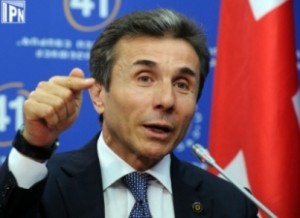
Dopo aver litigato negli anni con tutti i suoi alleati politici Saakashvili ha ora perso gli appoggi in Occidente, che ha puntato su Ivanishvili ricevendo in cambio garanzie sul futuro transito delle materie prime dal mar Caspio fino ai ricchi mercati europei. Il miliardario continuerà la politica di avvicinamento a Bruxelles ed alla Nato, ma tenterà anche di riallacciare le secolari relazioni con la Russia, vicino accomunato da una comune storia e dalla fede ortodossa.
Garantire adesso un tranquillo passaggio di potere sarà il compito primario di Saakashvili, che dovrà una volta tanto mantenere le promesse e assicurarsi un’onorevole uscita di scena.
Sin dalla primavera 1989 i georgiani hanno lottato per la democrazia e sono stati un esempio nell’Urss. Ora paiono esserci riusciti: il tempo dei kalashnikov, dei brogli elettorali e dei golpe di piazza a Tbilisi è davvero finito.
Giuseppe D’Amato
Грузия голосует за Парламент.
24 Sep 2012 «Скандал с избиениями и извращенным насилием в тюрьмах стал моральной пыткой для грузинского общества. На него накладывается близость парламентских выборов, в которых окончательно спутались все расклады. 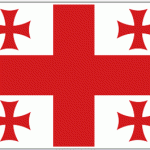
До скандала правящей партии президента Саакашвили социологи отдавали около 60 процентов голосов, а ее основному сопернику, партии бизнесмена Иванишвили, около 30, но теперь прогнозы пошли прахом. Президентская партия лишилась поддержки тех, кто еще думал, за кого голосовать, — говорят одни. Возможно, очищение после этой грязной истории пойдет власти на пользу, — возражают другие. Но в действительности, чем закончатся выборы, не знает никто… »
Репортаж – Айдер Муждабаев Московский Комсомолец № 26049 от 24 сентября 2012 г. Ayder Muzhdabaeyev Moskovskij Komsomolets
Bielorussia, ennesima elezione contestata.
23 Sep 2012 Intimidazioni, arresti di oppositori, litigi geopolitici. Ad ogni elezione in Bielorussia va in scena sempre lo stesso canovaccio. Non fanno eccezione le legislative di quest’anno.
Da martedì 18 settembre hanno già usufruito del voto anticipato ben il 20% degli aventi diritto. Secondo varie denunce le urne con le schede al loro interno rimarrebbero senza controllo e qualsiasi tipo di broglio sarebbe possibile. 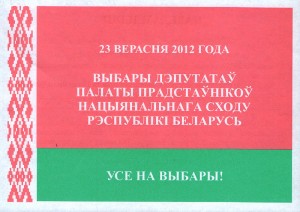
Sono oltre trecento i candidati che si contendono i 110 seggi parlamentari. Dovranno vincere con la maggioranza assoluta nella propria circoscrizione e sperare che l’affluenza alle urne sia superiore del 50% degli aventi diritto. Altrimenti sarà necessario un secondo turno.
I candidati vicini al presidente Lukashenko sono destinati a far man bassa di mandati parlamentari. Le opposizioni hanno infatti ritirato i propri rappresentanti a pochi giorni dal voto. “Queste sono state la peggiore campagna elettorale e le peggiori legislative di sempre”, la loro giustificazione.
Dal 1996 Unione europea, Stati Uniti ed Osce non riconoscono la validità delle elezioni bielorusse, minate da palesi violazioni e lontanissime dagli standard internazionali.
Questa volta una missione dell’Osce, l’Organizzazione per la sicurezza e la cooperazione in Europa, è stata invitata a presenziare alle legislative. Ma a due suoi osservatori (un tedesco ed un lituano) non è stato inspiegabilmente concesso il visto di ingresso.
Ad inizio settimana alcuni giornalisti stranieri, che avevano partecipato ad un incontro organizzato dalle opposizioni, sono finiti dietro alle sbarre. Ad un australiano della SBS è stata sequestrata l’intera attrezzatura all’aeroporto di Minsk.
Da anni Lukashenko ed alcuni alti funzionari bielorussi non possono mettere piede in Unione europea e negli Stati Uniti, dove sono stati dichiarati “persone non benvenute”.
Rispetto ad un paio di anni fa la situazione economica è migliorata anche se l’economia bielorussa rimane sull’orlo dell’abisso. Finora Minsk si è salvata soltanto grazie all’aiuto finanziario di Mosca, che teme di trovarsi alle frontiere un governo pro-occidentale. In cambio di questo sostegno la Russia si è comprata gli oleodotti e i gasdotti in transito sul territorio bielorusso verso l’Europa.
Crimean Forum, Soviet dissidents will continue to defend human rights in the former USSR.
23 May 2012 Prominent Soviet-era dissidents have founded the Crimean Forum, an annual meeting of political prisoners of the Communist regime and human rights activists, whose purpose is to ensure the consistency of the human rights movement of the former USSR in the work of civil society institutions in the former Soviet republics. 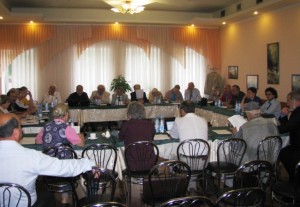
The forum was founded at a working meeting of prominent dissidents and fighters for human rights in the USSR, who had gathered together to remember of the victims of the genocide of the Crimean Tatars (the May 18, 1944 deportation), the Crimean Tatars’ Mejlis reported.
The meeting participants adopted a statement on the foundation of the Crimean Forum, stating that cardinal changes have occurred in the political and economic life of independent states since the collapse of the world Communist system over 20 years ago.
“However, no matter how different these changes may be, the situation with civil rights and freedoms in some former Communist states deserves close attention and often needs an immediate reaction from international institutions and human rights organizations. In countries such as the republics of Central Asia, Armenia, Belarus, Russia, and Ukraine, democratic processes are being stopped rapidly and political opposition and civil activists are being persecuted,” the statement says.
“Wishing to ensure the continuity of the human rights movement of the former USSR in the work of civil society institutions in the former Soviet states, we announce the foundation of the Crimean Forum, an annual meeting of political prisoners of the Communist regime and human rights activists in Crimea,” the statement says.
The meeting participants has tasked a working group with developing and discussing with all political prisoners of the Communist regime and human rights activists who share the idea of the foundation of the Crimean Forum organizational documents determining the composition of the forum, the procedures and time of its conviction, the formation of the agenda, and the decision-making process by September 1, 2012.
source Interfax-Ukraine
В работе совещания участвовали АЛЕКСЕЕВА Людмила (Россия, Москва), АРУТУНЯН Вардан (Армения, Ереван), БУКОВСКИЙ Владимир (Великобритания, Кембридж), ГОРБАНЕВСКАЯ Наталья (Франция, Париж), ГРИГОРЕНКО Андрей (США, Нью-Йорк), ДЖЕМИЛЕВ Мустафа (Украина, Бахчисарай), ЗИСЕЛЬС Иосиф (Украина, Киев), КАЛАБУГИН Валерий (Эстония, Таллинн), КОВАЛЕВ Сергей (Россия, Москва), ЛАВУТ Александр (Россия, Москва), МАРИНОВИЧ Мирослав (Украина, Львов), ОВСИЕНКО Василий (Украина, Киев), ПОДРАБИНЕК Александр (Россия, Москва), РЕДДАВЕЙ Петер (США, Вашингтон), СВЕРСТЮК Евгений (Украина, Киев), СЕЙТМУРАТОВА Айше (Украина, Симферополь), СМИРНОВ Алексей (Россия, Москва), ХАИРОВ Изет (Украина, Симферополь), ХЛЕБОВИЧ Петр (Польша, Краков), ШЕВЧЕНКО Олесь (Украина, Киев), ЯНКЕЛЕВИЧ Татьяна (США, Бостон).
NATO, Chicago Summit Declaration.
22 May 2012Issued by the Heads of State and Government participating in the meeting of the North Atlantic Council in Chicago on 20 May 2012 
We, the Heads of State and Government of the member countries of the North Atlantic Alliance, have gathered in Chicago to renew our commitment to our vital transatlantic bond; take stock of progress in, and reconfirm our commitment to, our operations in Afghanistan, Kosovo and elsewhere; ensure the Alliance has the capabilities it needs to deal with the full range of threats; and strengthen our wide range of partnerships.
20. NATO and the EU share common values and strategic interests. The EU is a unique and essential partner for NATO. Fully strengthening this strategic partnership, as agreed by our two organisations and enshrined in the Strategic Concept, is particularly important in the current environment of austerity; NATO and the EU should continue to work to enhance practical cooperation in operations, broaden political consultations, and cooperate more fully in capability development. NATO and the EU are working side by side in crisis management operations, in a spirit of mutual reinforcement, and in particular in Afghanistan, Kosovo and fighting piracy. NATO recognises the importance of a stronger and more capable European defence. NATO also recognises non-EU Allies’ ongoing concerns and their significant contributions to strengthening the EU’s capacities to address common security challenges. For the strategic partnership between NATO and the EU, non-EU Allies’ fullest involvement in these efforts is essential. In this context, NATO will work closely with the EU, as agreed, to ensure that our Smart Defence and the EU’s Pooling and Sharing initiatives are complementary and mutually reinforcing; we welcome the efforts of the EU, in particular in the areas of air-to-air refuelling, medical support, maritime surveillance and training. We also welcome the national efforts in these and other areas by European Allies and Partners. We also encourage the Secretary General to continue his dialogue with the EU High Representative with a view to making our cooperation more effective, and to report to the Council in time for the next Summit.
35. An independent, sovereign and stable Ukraine, firmly committed to democracy and the rule of law, is key to Euro-Atlantic security. Marking the fifteenth anniversary of the NATO-Ukraine Charter on a Distinctive Partnership, we welcome Ukraine’s commitment to enhancing political dialogue and interoperability with NATO, as well as its contributions to NATO-led operations and new offers made. We note the recent elimination of Ukraine’s highly enriched uranium in March 2012, which demonstrates a proven commitment to non-proliferation. Recalling our decisions in relation to Ukraine and our Open Door policy stated at the Bucharest and Lisbon Summits, NATO is ready to continue to develop its cooperation with Ukraine and assist with the implementation of reforms in the framework of the NATO-Ukraine Commission and the Annual National Programme (ANP). Noting the principles and commitments enshrined in the NATO-Ukraine Charter and the ANP, we are concerned by the selective application of justice and what appear to be politically motivated prosecutions, including of leading members of the opposition, and the conditions of their detention. We encourage Ukraine to address the existing shortcomings of its judicial system to ensure full compliance with the rule of law and the international agreements to which it is a party. We also encourage Ukraine to ensure free, fair and inclusive Parliamentary elections this autumn.
36. NATO-Russia cooperation is of strategic importance as it contributes to creating a common space of peace, stability and security. We remain determined to build a lasting and inclusive peace, together with Russia, in the Euro-Atlantic area, based upon the goals, principles and commitments of the NATO-Russia Founding Act and the Rome Declaration. We want to see a true strategic partnership between NATO and Russia, and we will act accordingly with the expectation of reciprocity from Russia.
37. This year, we mark the tenth anniversary of the establishment of the NATO-Russia Council (NRC) and the fifteenth anniversary of the NATO-Russia Founding Act. We welcome important progress in our cooperation with Russia over the years. At the same time, we differ on specific issues and there is a need to improve trust, reciprocal transparency, and predictability in order to realise the full potential of the NRC. In this context, we intend to raise with Russia in the NRC Allied concerns about Russia’s stated intentions regarding military deployments close to Alliance borders. Mindful of the goals, principles and commitments which underpin the NRC, and on this firm basis, we urge Russia to meet its commitments with respect to Georgia, as mediated by the EU on 12 August and 8 September 2008 3. We continue to be concerned by the build-up of Russia’s military presence on Georgia’s territory and continue to call on Russia to ensure free access for humanitarian assistance and international observers.
38. NATO and Russia share common security interests and face common challenges and our practical achievements together reflect that reality. Today, we continue to value the important role of the NRC as a forum for frank and honest political dialogue – including on subjects where we disagree – and for promoting practical cooperation. Our cooperation with Russia on issues related to Afghanistan – notably the two-way transit arrangements offered by Russia in support of ISAF, our joint training of counter narcotics personnel from Afghanistan, Central Asia, and Pakistan, and the NRC Helicopter Maintenance Trust Fund in support of a key ANSF need – is a sign of our common determination to build peace and stability in that region. NATO-Russia counter-terrorism cooperation has expanded and all NRC nations will benefit from the lessons to be learned from the first civil-military NRC Counter-Terrorism exercise, and the capabilities available under the NRC aviation counter-terrorism programme which is now operational. We also note with satisfaction our growing counter-piracy cooperation off the Horn of Africa. We are committed to, and look forward to, further improving trust and reciprocal transparency in: defence matters; strategy; doctrines; military postures, including of non-strategic nuclear weapons in Europe; military exercises; arms control and disarmament; and we invite Russia to engage with the Alliance in discussing confidence-building measures covering these issues.
47. With our vision of a Euro-Atlantic area at peace, the persistence of protracted regional conflicts in South Caucasus and the Republic of Moldova continues to be a matter of great concern for the Alliance. We welcome the constructive approach in the renewed dialogue on Transnistria in the 5+2 format, and encourage further efforts by all actors involved. With respect to all these conflicts, we urge all parties to engage constructively and with reinforced political will in peaceful conflict resolution, and to respect the current negotiation formats. We call on them all to avoid steps that undermine regional security and stability. We remain committed in our support of the territorial integrity, independence, and sovereignty of Armenia, Azerbaijan, Georgia, and the Republic of Moldova, and will also continue to support efforts towards a peaceful settlement of these regional conflicts, based upon these principles and the norms of international law, the United Nations Charter, and the Helsinki Final Act.
48. The Black Sea region continues to be important for Euro-Atlantic security. We welcome the progress in consolidating regional cooperation and ownership, through effective use of existing initiatives and mechanisms, in the spirit of transparency, complementarity and inclusiveness. We will continue to support, as appropriate, efforts based on regional priorities and dialogue and cooperation among the Black Sea states and with the Alliance.
52. A stable and reliable energy supply, diversification of routes, suppliers and energy resources, and the interconnectivity of energy networks, remain of critical importance. While these issues are primarily the responsibility of national governments and other international organisations concerned, NATO closely follows relevant developments in energy security. Today, we have noted a progress report which outlines the concrete steps taken since our last Summit and describes the way forward to integrate, as appropriate, energy security considerations in NATO’s policies and activities. We will continue to consult on energy security and further develop the capacity to contribute to energy security, concentrating on areas where NATO can add value. To this end, we will work towards significantly improving the energy efficiency of our military forces; develop our competence in supporting the protection of critical energy infrastructure; and further develop our outreach activities in consultation with partners, on a case-by-case basis. We welcome the offer to establish a NATO-accredited Energy Security Centre of Excellence in Lithuania as a contribution to NATO’s efforts in this area. We task the Council to continue to refine NATO’s role in energy security in accordance with the principles and the guidelines agreed at the Bucharest Summit and the direction provided by the new Strategic Concept as well as the Lisbon decisions. We task the Council to produce a further progress report for our next Summit.
Complete Text – NATO – Chicago.
Vladimir Putin, appuntamento con la storia.
8 May 2012 Lo zar è tornato. Dopo quattro anni da primo ministro Vladimir Putin è di nuovo capo del Cremlino. Fastosa la cerimonia con cui la Russia lo ha incoronato per la terza volta. Rigido il protocollo in cui tutto era calcolato al secondo: dall’entrata del neoeletto nel grande Palazzo del Cremlino ai due brevi discorsi, dal suono delle campane alle ore 12 precise alle 31 salve di cannone. 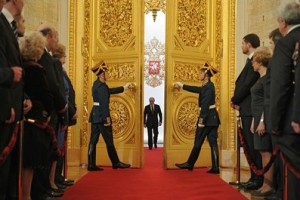
Ma è un Putin diverso dal passato, si sono affannati in questi giorni a scrivere diversi commentatori. L’ex agente dagli occhi di ghiaccio, è stato rimarcato, sarà costretto ad aperture e a confrontarsi con l’opposizione.
All’ingresso al Cremlino Vladimir Putin è apparso quasi emozionato come se il suo fosse un appuntamento non solo col Paese ma anche con la storia. Il “leader nazionale”, come lo chiamano i suoi sostenitori, ha, però, subito ritrovato il tradizionale piglio aggressivo quando ha letto la formula del giuramento. Quindi il discorso tutto incentrato sulla Patria e nel credere in lei.
Doveroso all’inizio dell’intervento è stato il tributo al suo giovane “delfino”, Dmitrij Medvedev, che gli ha permesso questa operazione politica per aggirare il divieto dei due mandati presidenziali consecutivi (2000 e 2004), stabiliti dalla Costituzione.
Come si ricorderà nel 2008 Putin candidò al proprio posto di capo dello Stato uno dei suoi vice, rimanendo come primo ministro. Adesso il tandem si ricambia le cariche e l’ex presidente ha subito incassato la fiducia come primo ministro dalla Duma con 299 “sì” e 144 “no”.
Gli altri punti del breve discorso del neopresidente al Cremlino hanno riguardato la volontà di rafforzare la democrazia e la libertà, nonché la necessità di migliorare l’economia. Uno degli obiettivi per una “Russia di successo” nei prossimi sei anni di suo mandato è quello di diventare “leader in Euro-Asia”. Ossia viene riproposto nuovamente con forza il progetto di fondare sull’esempio dell’Unione europea una Comunità economica delle repubbliche ex sovietiche. Finora Russia, Bielorussia e Kazakhstan hanno già creato l’Unione doganale, mentre le altre per ora stanno a guardare.
All’uscita tra due ali di folla, composta dai notabili e da alcuni leader stranieri ospiti – tra i quali Silvio Berlusconi e l’ex cancelliere tedesco Gehrard Schroeder -, è apparso un sorriso sul viso del neopresidente, che si è fermato a stringere le mani dei presenti e a baciare una sostenitrice cieca. Quindi la parte militare con la consegna della famosa valigetta nucleare con i codici di controllo dell’arsenale russo. Putin e Medvedev, insieme alle rispettive signore, sono stati ricevuti in forma privata dal Patriarca Alessio II.
Dopo una manciata di ore dall’insediamento ecco subito i primi decreti presidenziali di Vladimir Putin. Società ed economia sono i primi campi toccati. Il neopresidente ha chiesto anche una verifica del piano per le prossime privatizzazioni.
Putin si è poi congratulato con il neo collega francese Francois Hollande per la sua elezione, dicendosi “pronto a lavorare con lui attivamente”.
La Russia, si legge in un documento del Cremlino, cercherà legami più stretti con gli Stati Uniti, ma non tollererà influenze nei suoi affari e chiede garanzie che lo Scudo anti-missilistico Usa non sia contro di lei.
Contemporaneamente alla cerimonia di insediamento un centinaio di persone, tra cui l’ex vicepremier riformista Boris Nemtsov, sono state fermate dalla polizia in piazza del Maneggio, di fronte al Cremlino. In una Mosca spettrale e blindata – ancora provata dagli incidenti di due giorni fa con decine di feriti e centinaia di arresti – oltre un migliaio di oppositori anti-Putin ha inscenato una nuova manifestazione di protesta non lontano da piazza Pushkin. La loro richiesta – uguale a quella dei circa 70mila di domenica – è sempre la stessa: elezioni libere al più presto. Per ora la politica ha risposto con la riforma del sistema di registrazione dei partiti.
«Европейско-Азиатский союз? Только этого еще нам не хватало!» Такой, как мне кажется, должна была бы быть первая естественная реакция думающего российского налогоплательщика, когда недавно объявили о новом интеграционном проекте на пространстве бывшего СССР. А максимум через секунду я ожидал бы услышать уже конкретный вопрос: «Кто заплатит за это удовольствие?» …
Давайте проанализируем вероятную динамику общественного и экономического развития в странах — основателях будущего Евроазиатского союза — России, Беларуси и Казахстане. 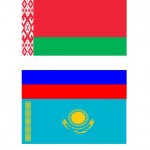
В России на выборах выиграла «стабильность» …
В изолированной Беларуси индустриальная отрасль уже выработала свой ресурс …
В Казахстане декабрьские беспорядки в Жанаозене стали очень тревожным социальным сигналом…
Кроме того, Беларусь и Казахстан имеют одну общую и серьезную политическую проблему: ни у Лукашенко, ни у Назарбаева нет преемника…
Думать о том, что Украина вдруг вернется в объятия Москвы в ЕАС, уже просто нет смысла…
Как было объявлено, «Евроазиатский союз должен следовать по стопам ЕС». То есть сначала на постсоветском пространстве надо создать нечто похожее на Европейское экономическое сообщество…
Какая морально-философская база лежит в основе создающегося Евроазиатского союза? Какие личности могли бы гарантировать непростые интеграционные шаги в будущее? …
Какие новые идеи можно реализовать, не рискуя совершить старые советские ошибки? …»
Статья – Джузеппе Д’Амато Московский Комсомолец № 25924 от 23 апреля 2012 г. Giuseppe D’Amato Moskovskij Komsomolets.
The European Union foreign ministers on March 23 decided to impose sanctions on a further 12 Belarusians, including businesspeople, and 29 Belarusian companies to punish the Lukashenka regime for the repression of political activists and civil society representatives, BelaPAN said.
In particular, the EU Council added the 12 persons to the 27-nation bloc’ list of those targeted by a travel ban and asset freeze, reported euroalert.net. They include individuals benefiting from or supporting the regime, as well as persons responsible for the repression of civil society and the democratic opposition in Belarus. 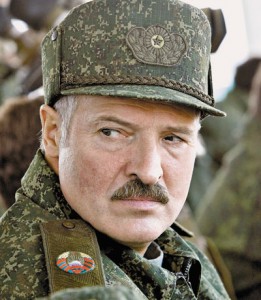
In addition, the EU Council froze the assets of 29 entities, which are controlled by persons subject to restrictive measures due to their role in supporting the regime.
“I am extremely concerned about what is happening with the civil society,” said Catherine Ashton, the EU’s high representative for foreign affairs and security policy, speaking ahead of the EU Council’s meeting in Brussels. “We have been extremely clear about the regime in Belarus that they release political prisoners. We would like to engage with them when they comply with what we have asked them to do.”
In an interview with the government`s news agency BelTA earlier this week, Andrey Savinykh, spokesman for the Belarusian foreign ministry, said that the EU should stop using pressure against Belarus if it wanted to “settle existing differences.”
Both Belarus and the EU will benefit from a “mutually acceptable settlement” of them, said Mr. Savinykh.
“The EU should in the first place drop the practice of reinforcing its sanctions on a regular basis,” said the spokesman. “The point is not about whether the sanctions are efficient. What is important is that this practice rules out the possibility of bringing sensibly and reasonably the positions closer to each other.”
On January 31, 2011, the EU Council imposed asset freezes and travel bans on 156 Belarusian government officials and other individuals for their role in “the violations of international electoral standards” in the December 14-19, 2010 presidential election and a post-election crackdown on civil society and pro-democratic supporters. The Council blacklisted more Belarusians later, placing on the list judges and prosecutors involved in the prosecution of post-election protesters, as well as the judge and the public prosecutor in the trial of prominent human rights defender Ales Byalyatski.
The EU Council`s Friday decision brought the total number of Belarusians on the blacklist to 234.
After the EU imposed travel bans and asset freezes on new Belarusian officials on February 27, the Belarusian foreign ministry “recommended” that the head of the EU delegation to Belarus and the ambassador of Poland to Belarus return to their capitals for consultations, while simultaneously recalling the country`s permanent representative in Brussels and ambassador in Warsaw.
All EU ambassadors have left Belarus since “in expression of solidarity and unity.”
Materials from BelaPAN, Naviny
Moldova, la speranza Timofti.
21 Mar 2012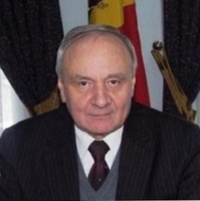
Nicolae Timofti
Finalmente! Dopo tre anni di vani tentativi, con un paio di voti popolari anticipati e disordini di piazza, la settimana scorsa la Moldova è riuscita ad eleggere un presidente. Era dall’aprile 2009, quando Vladimir Voronin lasciò l’incarico per la scadenza del mandato, che la repubblica ex sovietica non aveva un capo dello Stato nel pieno delle sue funzioni. Totale: 917 giorni di una crisi istituzionale interminabile, che stava minando seriamente le fondamenta del giovane Stato moldavo.
L’origine di tutte le tribolazioni è da ricercarsi principalmente in una Costituzione, scritta da giuristi poco esperti, con alle spalle un retaggio troppo sovietico. Il presidente è, infatti, eletto dai 101 deputati del Parlamento, che viene sciolto dopo tre votazioni fallite. Ma non solo: serve anche una maggioranza qualificata di 62 voti. In presenza di un’assemblea divisa la scelta del capo dello Stato è praticamente impossibile.
Così anche venerdì scorso al Parlamento moldavo si è assistito a vere e proprie scene da carbonari. La votazione, prevista in un primo momento per le 15, è stata anticipata all’improvviso alle 8 del mattino. Il Partito comunista, in netto contrasto con la maggioranza relativa, aveva indetto una manifestazione davanti ai palazzi del potere per le 13,30.
Per evitare i “franchi tiratori”, definiti più sbrigativamente “traditori”, i partiti dell’“Alleanza per l’integrazione europea” hanno fatto piegare ai propri deputati le schede da depositare nell’urna segreta in una ben determinata maniera. Tre parlamentari hanno vigilato sulla correttezza dei colleghi, mentre l’unico rappresentante del Pc, presente in aula, si è dilungato in un discorso semplicemente intimidatorio.
Conclusione: i tre fuoriusciti dal Pc, i quali hanno formato recentemente il gruppo socialista, sono stati determinanti. Il giudice 63enne Nicolae Timofti è stato eletto presidente, il quarto nella breve storia repubblicana, con 62 voti. Quanto tempo starà in carica è ancora un mistero, poiché i costituzionalisti locali interpretano ognuno a propria maniera le norme.
Considerata in epoca sovietica la “cantina” dell’“impero”, la repubblica latina dell’Urss ha terribilmente sofferto il passaggio all’economia di mercato. Nel 1992 una sua regione a maggioranza slava, la Transnistria, chiamata anche la “Lombardia” della Moldavia, si è separata dopo una guerra sanguinosa. Tutti i negoziati di riconciliazione nazionale sono finora falliti. 600mila moldavi su una popolazione di 4,4 sono emigrati all’estero, 100mila solo in Italia. Molti di loro detengono un passaporto romeno ed alcuni politici a Bucarest mirano in futuro a farla tornare sotto l’egida della madrepatria.
L’Unione europea si è impegnata a fondo per non vedere la “Dacia” di romana memoria trasformarsi in un buco nero. “Dobbiamo essere un ponte tra Est ed Ovest”, ha subito promesso Timofti. La sua costruzione, però, è tremendamente complessa!
Развод по-советски – The Soviet DisUnion. Giuseppe D’Amato. Презентация книги. Presentation.
3 Mar 2012
Развод по-советскиПрошлое и будущее постсоветского пространства. The Soviet DisUnionThe Past and the Future of the post Soviet area. |
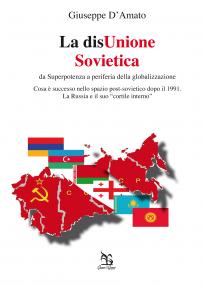 |
|
В ходе встречи состоится презентация книги La DisUnione Sovietica. da Superpotenza a periferia della globalizzazione. Milano, Greco&Greco editori, 2012. Присутствуют: ректор РГГУ профессор Е.И. Пивовар и автор книги Джузеппе Д’Амато, а также гости – дипломаты, журналисты.
Понедельник – 5-го марта в 14.00 часов – ауд. 220 Miusskaya sq, 6, Moscow. Metro Novoslabodskaja. Contact telephone: Rectorate (499)2506910 |
Welcome
We are a group of long experienced European journalists and intellectuals interested in international politics and culture. We would like to exchange our opinion on new Europe and Russia.
Categories
- Breaking News (11)
- CIS (129)
- Climate (2)
- Energy&Economy (115)
- EU Eastern Dimension (85)
- Euro 2012 – Sochi 2014 – World Cup 2018, Sport (43)
- Euro-Integration (135)
- History Culture (198)
- International Policy (261)
- Military (74)
- Interviews (18)
- Italy – Italia – Suisse (47)
- Odd Enough (10)
- Poland and Baltic States (126)
- Religion (31)
- Russia (421)
- Survey (4)
- Turning points (4)
- Ukraine (176)
- Российские страницы (113)
Archives
- November 2020
- October 2020
- September 2020
- August 2020
- July 2020
- May 2020
- April 2020
- March 2020
- January 2020
- December 2019
- November 2019
- October 2019
- September 2019
- August 2019
- July 2019
- June 2019
- May 2019
- April 2019
- March 2019
- February 2019
- December 2018
- November 2018
- October 2018
- September 2018
- August 2018
- July 2018
- June 2018
- May 2018
- April 2018
- March 2018
- February 2018
- January 2018
- December 2017
- November 2017
- October 2017
- September 2017
- August 2017
- July 2017
- May 2017
- March 2017
- January 2017
- December 2016
- November 2016
- October 2016
- September 2016
- July 2016
- June 2016
- May 2016
- April 2016
- February 2016
- January 2016
- November 2015
- October 2015
- September 2015
- June 2015
- April 2015
- March 2015
- February 2015
- January 2015
- December 2014
- November 2014
- October 2014
- September 2014
- August 2014
- July 2014
- June 2014
- May 2014
- April 2014
- March 2014
- February 2014
- January 2014
- December 2013
- November 2013
- October 2013
- September 2013
- August 2013
- July 2013
- June 2013
- May 2013
- April 2013
- March 2013
- February 2013
- January 2013
- December 2012
- November 2012
- October 2012
- September 2012
- August 2012
- July 2012
- June 2012
- May 2012
- April 2012
- March 2012
- February 2012
- January 2012
- December 2011
- November 2011
- October 2011
- September 2011
- August 2011
- July 2011
- June 2011
- May 2011
- April 2011
- March 2011
- February 2011
- January 2011
- December 2010
- November 2010
- October 2010
- September 2010
- August 2010
- July 2010
- June 2010
- May 2010
- April 2010
- March 2010
- February 2010
- January 2010
- December 2009
- November 2009
- October 2009
- September 2009
- August 2009
Our books




